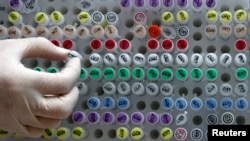Britain could become the first country in the world to allow the creation of babies with DNA from three people.
The House of Commons voted 382 to 128 to approve the controversial type of in-vitro fertilization that could prevent mothers from passing inherited health problems such as serious heart and brain disorders and muscular dystrophy. But critics see it as a step toward creation of designer babies.
The treatment is known as "three-parent" in vitro fertilization (IVF) because the babies, born from genetically modified embryos, would have DNA from a mother, a father and from a female donor.
It is designed to help families with mitochondrial diseases, incurable conditions passed down the maternal line that affect around one in 6,500 children worldwide.
After an emotionally charged 90-minute debate that some lawmakers criticized as being too short for such a serious matter, parliament voted 382 to 128 in favor of the technique, called mitochondrial donation.
The vote paves the way for a medical world first for Britain, but one that is fiercely disputed by some religious groups and other critics.
The process involves intervening in the fertilization process to remove mitochondria, which act as tiny energy-generating batteries inside cells, and which, if faulty, can cause inherited conditions such as fatal heart problems, liver failure, brain disorders, blindness and muscular dystrophy.
Mitochondrial DNA is separate from DNA found in the cell nucleus and does not affect human characteristics such as hair or eye color, appearance or personality traits.
"I for one would be absolutely certain I wouldn't stand here and defend the concept of designer babies — choosing the color of the eyes and all the rest of it. This is about purely dealing with those terrible, terrible illnesses," opposition Labor lawmaker Andrew Miller, chair of parliament's science and technology committee, said during the debate.
The Roman Catholic Church, which is opposed to any artificial reproductive techniques, opposes the British proposal, as does the Church of England, which said last week there has not been enough scientific study of the medical techniques involved.
'Unimaginably cruel'
International charities, advocacy groups and scientists had urged Britain to pass laws to allow the treatment, saying it brought a "first glimmer of hope" for some families of having a baby who could live without suffering.
"We have finally reached a milestone in giving women an invaluable choice, the choice to become a mother without fear of passing on a lifetime under the shadow of mitochondrial disease to their child," Robert Meadowcroft, chief executive of the Muscular Dystrophy Campaign, said following the vote.
In an open letter to lawmakers, 11 international campaign groups, including the U.S. United Mitochondrial Disease Foundation, described the condition as "unimaginably cruel."
"It strips our children of the skills they have learned, inflicts pain that cannot be managed and tires their organs one by one until their little bodies cannot go on any more," they wrote.
Lawmakers were given a free vote on the issue, and Prime Minister David Cameron's spokesman said the British leader had voted to support it, adding it was not "about playing God."
"He has a particular sympathy with those parents whose children are born with very serious illnesses, that in nearly all cases end their lives prematurely," the spokesman said, referring to Cameron's son Ivan who suffered from cerebral palsy and severe epilepsy and died aged six in 2009.
Critics, however, say the technique will lead to the creation of genetically modified "designer babies," with Conservative lawmaker Fiona Bruce saying it would amount to letting "the genie out of the bottle."
"Where will it lead? The answer has to be that we stop here. The answer has to be that we say this is a red line in our country, as in every other country in the world, that we will not cross," she said during the debate.
Proposed new laws allowing the treatments to be carried out in Britain still have to be approved by the upper house, which commentators expect to endorse parliament's support.
Some material for this report came from Reuters.





